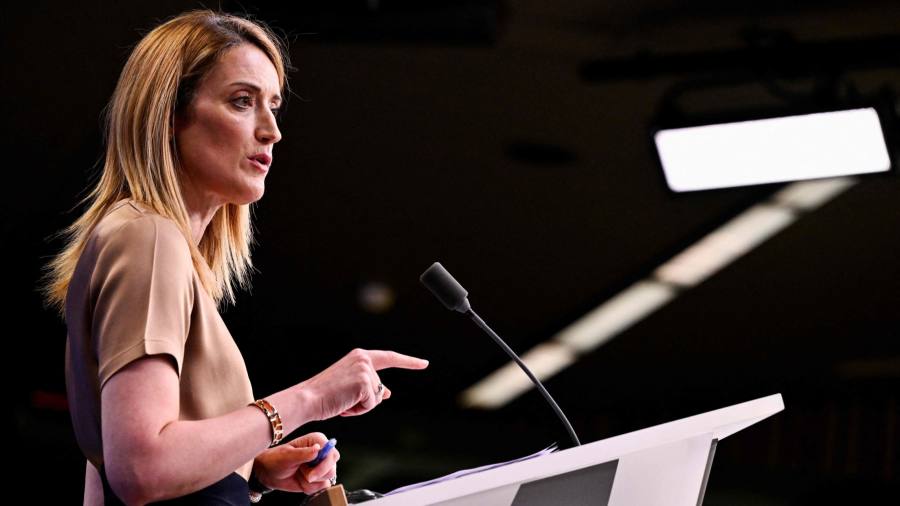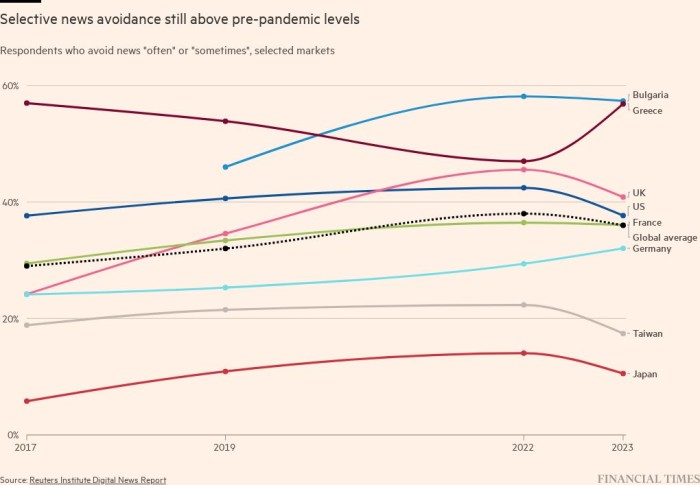
Receive free European Parliament updates
We’ll send you a myFT Daily Digest email rounding up the latest European Parliament news every morning.
This article is an on-site version of our Europe Express newsletter. Sign up here to get the newsletter sent straight to your inbox every weekday and Saturday morning
Good morning. This week I’m in Vilnius for the Nato summit where the US and Germany are still resisting pressure from other countries to advance Ukraine’s bid for membership of the alliance. Read our deep dive into the critical issue, which is existential for both Ukraine and Nato.
Today, we interview the president of the European parliament, who admits it took a corruption scandal to force reform of the chamber’s rules, and our Turkey correspondent previews a crunch meeting for another Nato membership hopeful: Sweden.
Blessing in disguise?
Keeping things the same is easier than changing — until it’s not. That also seems to be the case for the slow-moving European parliament, write Laura Dubois and Alice Hancock.
Days before a vote on anti-corruption recommendations following the “Qatargate” scandal, parliament president Roberta Metsola told the FT that the affair was instrumental in prompting reform.
Context: Last December, Belgian authorities raided parliament and arrested several sitting and former lawmakers on suspicion of bribery. In response, a 14-point reform plan was proposed, and plans were advanced for a new body to create common ethics standards for the EU institutions.
“If it had not been for what happened on the ninth of December and in the aftermath, we would not have implemented all these measures,” Metsola said.
She said the day the scandal became public was a “most difficult day for me”. But it had also shown “that there were gaps which needed to be filled”.
The reforms include, among other things, a six-month cooling-off period for MEPs before they can work as lobbyists. Metsola also said training of new lawmakers would be “revamped completely”, including on “how to be aware of what to do and what not to do”.
MEPs are due to vote on an anti-corruption report on Thursday.
Critics, however, say the measures proposed so far don’t go far enough and there is little appetite to change things — reinforcing the point that, without the scandal, nothing would have changed at all.
Metsola maintains that the reforms will be significant. “Next year, we will have a much more modern and efficient and open parliament for the new membership,” she said, referring to next year’s elections. “In a year from now, I hope we can be judged on that.”
With the possible accession of Ukraine and other candidates to the EU, lawmakers will have to contend with more drastic changes. “What works for 27 [member states] will not work for 32 or 33,” Metsola said.
Realistically, either the distribution of MEPs per country will have to be adjusted or parliament — currently capped at 750 members — must become much bigger.
“Everything needs to change,” Metsola added.
Chart du jour: Blinkers on

More than half of people in Greece and Bulgaria try not to read, watch or listen to the news, according to the Reuters Institute Digital News Report. The topic readers across countries tried to avoid most was the war in Ukraine. Read more in Datawatch.
Another try
Swedish prime minister Ulf Kristersson will today make a last-ditch appeal to Turkish president Recep Tayyip Erdoğan to approve his country’s bid to join Nato before the military alliance’s pivotal meeting in Vilnius kicks off tomorrow.
The mood in Ankara is not upbeat, writes Adam Samson.
Context: Turkey has for months rebuffed calls from Washington and European capitals to allow Sweden’s accession to Nato, arguing Stockholm has not done enough to fight terrorism. Sweden has already made several concessions, including passing a new anti-terrorism law.
Last week, Swedish courts used it to sentence a Turkish man to jail for providing financial support to the Kurdistan Workers’ party (PKK), a group that has fought a decades-long insurgency in Turkey and is considered a terrorist group by the US, EU and Turkey.
Erdoğan has said that while these are steps in the right direction, Sweden must do more to prove it is serious about fighting terrorism.
Sweden’s decision a fortnight ago to allow a protester to burn a Koran in front of a Stockholm mosque at the start of a Muslim holiday also prompted a furious backlash in Turkey. Kristersson said the protest was “legal but not appropriate”.
“Allowing Koran burning was very stupid,” said a former senior Turkish diplomat, who does not expect Turkey to approve Sweden’s Nato accession at the Vilnius summit. “They are not provoking only Turkey, but the whole of the Islamic world.”
To be sure, there is also plenty on the line for Turkey.
Ankara is lobbying the US Congress to approve the purchase of F-16 fighter jets. While the Biden administration has been supportive, analysts expect Turkey will need to approve Sweden’s Nato bid to unlock the deal.
Erdoğan spoke with US president Joe Biden last night and told him that the recent protests in Sweden “nullify the steps taken” by Stockholm against terror groups.
What to watch today
-
EU environment ministers meet in Valladolid, Spain.
-
European parliament plenary kicks off in Strasbourg.
Now read these
Recommended newsletters for you
Britain after Brexit — Keep up to date with the latest developments as the UK economy adjusts to life outside the EU. Sign up here
Trade Secrets — A must-read on the changing face of international trade and globalisation. Sign up here
Are you enjoying Europe Express? Sign up here to have it delivered straight to your inbox every workday at 7am CET and on Saturdays at noon CET. Do tell us what you think, we love to hear from you: [email protected]. Keep up with the latest European stories @FT Europe